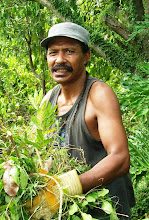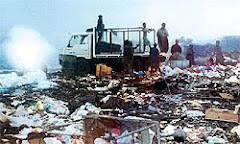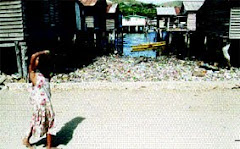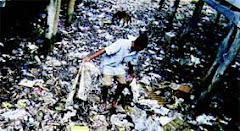The area within the yellow line is the subject area for the pilot project for my recycling project. The area covers Hohola 1, 2, 3, 4 & 5 residential communities.
Saturday, May 22, 2010
FROM THE OUTSIDE LOOKING IN - 'THE OUTSIDER'
[Posted on the Blackboard Class Discussion Board on Thursday 20th May 2010 at 2:09:34 PM EST]
How do we place ourselves in the situation where we are trying to provoke a community action for the benefit of the community itself? How do we identify ourselves when dealing with a community that we are not part of? How will the community contain the situation that we trying to influence and re-create their thinking in accepting a change in their community?
In my recycling project, I am 'the Outsider' trying out a pilot project in a community that I am not part of. [ The Outside-In concept]. The community is a suburban residential area in Port Moresby, and involves people who identify themselves as belonging to that particular area. There is both a spatial and social dimension of that area. The difficulty in coordinating the project depends on the 'status' on the community - some parts of the community are highly organised and cohesive, whilst other parts only have spatial relationship and no social identity. Most instances, people who are from the same or similar cultural background converge as an organised group as well as those with same or shared interests. The 'wantokism' is very much alive in community groupings in Port Moresby. [' Wantok' - 'one-talk' identifies as people related through communicating in or speaking the same language, whether it be their mother tongues, or the same lingua franca. It is also loosely used for people originating from the same area or region]. Wantokism can be advantageous in participation, however it does have negative effects.
I can be identified as an 'Outsider' because I am a professional and a development practitioner. My professional role as a physical planner may be seen as 'part of the top-down approach' and may be taken with mixed feelings. Most of the communities live in situations where the government or the city authority have greater power over them in terms or facilities and services. Together with the city authority - NCDC, the project can be pushed through by appropriate legislation, however that defeats the idea of proper community participation and acceptance. Some legislation have not worked because people where not involved or properly made aware of the intentions, or projects did not meet or fit the needs of the community. My role here as the 'Outsider' varies, from active involvement as an initiator of the project, to a passive role when acting as a facilitator. I need to fully understand the situation in the community before I can commence. Through establishing networks, identifying major stakeholders, identifying active community groups like women's, youth, sporting and church groups, linking up with prominent people within the community, assessing the current waste disposal manners, and the interest of people willing to involve in the recycling project - 'the interest group', I may be able to set up the base to work upon as the initiator or advocate. Working on existing legislation and policies and coordinating with the NCDC, I may be able to set up workshops for community participation and empowerment. The intention is for the community to take 'ownership' of the project within their area, and recognise its importance in cleanliness of their community, and establishing stronger community networks and bond.
The community must be given the due respect in the approach to initiate the recycling project. They must be well aware and acquainted with the intentions and status of the project. They must be involved in the consultative participation - I work on the information directly from the community - , the shared participation - community and me as the outsider interacting as equals -, which leads to them having the sense of ownership of the project. In that way, I also become a stakeholder so the concept of me being 'the Outsider' fades away and my belonging as a member of the community is thereby established. The next challenge is for me as 'an Insider' [ The Inside-Out concept] to request for sponsorship for the project, and negotiation for funding through NCDC and other relevant government departments and agencies. The community can initiate its own project funding agenda.
The only plan of action for the project to date is establishing networks and proposing public awareness campaigns in the suburban residential areas. As this will be an on-going project leading out [from this course], I intend to set the pace when I return during and after studies. Hence, the community action plan will only be realised by then.
How do we place ourselves in the situation where we are trying to provoke a community action for the benefit of the community itself? How do we identify ourselves when dealing with a community that we are not part of? How will the community contain the situation that we trying to influence and re-create their thinking in accepting a change in their community?
In my recycling project, I am 'the Outsider' trying out a pilot project in a community that I am not part of. [ The Outside-In concept]. The community is a suburban residential area in Port Moresby, and involves people who identify themselves as belonging to that particular area. There is both a spatial and social dimension of that area. The difficulty in coordinating the project depends on the 'status' on the community - some parts of the community are highly organised and cohesive, whilst other parts only have spatial relationship and no social identity. Most instances, people who are from the same or similar cultural background converge as an organised group as well as those with same or shared interests. The 'wantokism' is very much alive in community groupings in Port Moresby. [' Wantok' - 'one-talk' identifies as people related through communicating in or speaking the same language, whether it be their mother tongues, or the same lingua franca. It is also loosely used for people originating from the same area or region]. Wantokism can be advantageous in participation, however it does have negative effects.
I can be identified as an 'Outsider' because I am a professional and a development practitioner. My professional role as a physical planner may be seen as 'part of the top-down approach' and may be taken with mixed feelings. Most of the communities live in situations where the government or the city authority have greater power over them in terms or facilities and services. Together with the city authority - NCDC, the project can be pushed through by appropriate legislation, however that defeats the idea of proper community participation and acceptance. Some legislation have not worked because people where not involved or properly made aware of the intentions, or projects did not meet or fit the needs of the community. My role here as the 'Outsider' varies, from active involvement as an initiator of the project, to a passive role when acting as a facilitator. I need to fully understand the situation in the community before I can commence. Through establishing networks, identifying major stakeholders, identifying active community groups like women's, youth, sporting and church groups, linking up with prominent people within the community, assessing the current waste disposal manners, and the interest of people willing to involve in the recycling project - 'the interest group', I may be able to set up the base to work upon as the initiator or advocate. Working on existing legislation and policies and coordinating with the NCDC, I may be able to set up workshops for community participation and empowerment. The intention is for the community to take 'ownership' of the project within their area, and recognise its importance in cleanliness of their community, and establishing stronger community networks and bond.
The community must be given the due respect in the approach to initiate the recycling project. They must be well aware and acquainted with the intentions and status of the project. They must be involved in the consultative participation - I work on the information directly from the community - , the shared participation - community and me as the outsider interacting as equals -, which leads to them having the sense of ownership of the project. In that way, I also become a stakeholder so the concept of me being 'the Outsider' fades away and my belonging as a member of the community is thereby established. The next challenge is for me as 'an Insider' [ The Inside-Out concept] to request for sponsorship for the project, and negotiation for funding through NCDC and other relevant government departments and agencies. The community can initiate its own project funding agenda.
The only plan of action for the project to date is establishing networks and proposing public awareness campaigns in the suburban residential areas. As this will be an on-going project leading out [from this course], I intend to set the pace when I return during and after studies. Hence, the community action plan will only be realised by then.
My fear is gradually fading.........
[Posted in the Blackboard Class Discussion Board on Saturday 15th May 2010 at 3:01:02 AM EST]
No relevance to any projects, but just a reflection of my personal approach in absorbing the assessment results.................
Coming out from the 'thorny' weeks of assessment, I have realised that proper planning and time management can really change whatever situation you may be in. Absorbing the results of three of the four recent assessment submissions, it made me believe that I have been under-estimating my own capabilities, ..probably because of the mental fear and pressure taking advantage over me. My realisation has resulted from taking the comments given positively, even though I had average marks. Full blame on me as these were the results of my own doing.
The group project from a course I take had very pleasing results and the group is happy with the results and want to achieve a better result on the presentation and final submission. A positive thought by each member of the group. It all comes down to a good teamwork, a good team spirit and positive mindset. Cooperation, support and participation, and good understanding among all members have produced pleasing results. That I see is a clear example of practical 'collective action' striving for desired outcomes.
The results of another course was not too pleasing, however that have given me the challenge and the opportunity to produce a better work in my final assessment. "Pity as you are more than capable' hit the point. I have learnt and understood my mistakes and failures. I have taken the comments as a positive step for positive results.
The results of my Project Plan, however had been better than I expected. Time management was the key issue because I had to do two assignments simultaneously since they had the same due date. That forced me into typing errors, 'Americanized' words, and a bit of repetition work and less attention on sentence structure. Even lost marks for (very) late submission and excess length. However, since the mark was better than expected, my FEAR to tackle my project is starting to fade and the COURAGE to continue to work my project plan is now gripping in........
I encourage my fellow students who are more or less in the same situation as me to 'think positively, plan positively and work positively' to achieve the desired outcomes.
No relevance to any projects, but just a reflection of my personal approach in absorbing the assessment results.................
Coming out from the 'thorny' weeks of assessment, I have realised that proper planning and time management can really change whatever situation you may be in. Absorbing the results of three of the four recent assessment submissions, it made me believe that I have been under-estimating my own capabilities, ..probably because of the mental fear and pressure taking advantage over me. My realisation has resulted from taking the comments given positively, even though I had average marks. Full blame on me as these were the results of my own doing.
The group project from a course I take had very pleasing results and the group is happy with the results and want to achieve a better result on the presentation and final submission. A positive thought by each member of the group. It all comes down to a good teamwork, a good team spirit and positive mindset. Cooperation, support and participation, and good understanding among all members have produced pleasing results. That I see is a clear example of practical 'collective action' striving for desired outcomes.
The results of another course was not too pleasing, however that have given me the challenge and the opportunity to produce a better work in my final assessment. "Pity as you are more than capable' hit the point. I have learnt and understood my mistakes and failures. I have taken the comments as a positive step for positive results.
The results of my Project Plan, however had been better than I expected. Time management was the key issue because I had to do two assignments simultaneously since they had the same due date. That forced me into typing errors, 'Americanized' words, and a bit of repetition work and less attention on sentence structure. Even lost marks for (very) late submission and excess length. However, since the mark was better than expected, my FEAR to tackle my project is starting to fade and the COURAGE to continue to work my project plan is now gripping in........
I encourage my fellow students who are more or less in the same situation as me to 'think positively, plan positively and work positively' to achieve the desired outcomes.
Wednesday, May 12, 2010
I RECYCLE; YOU RECYCLE; WE RECYCLE......
Recycling is not everyone's pastime, not everyone's idea, not everyone's concern, and not everyone's business today! Yet, it is not hard, and is one of the best ways everyone can do something positive for the environment.
The extent of the NEED for recycling is much, much higher is developed countries and densely-populated developing countries. Recycling programs are racing against the issue of waste pollution, landfill disposals, environmental degradation, and depletion of the earth's resources.
Is everyone doing their part? Is everyone concern? Is recycling a priority in waste management? Should not we recycle?
In today's scenario, the significance of recycling is rising as more people realise the cause of the great concern that earth is being depleted from its natural resources, and adopting recycling methods to sustain a healthy balance in the ecological system.
Recycling simply is all about the process of making the used materials suitable for further use, and additionally reduces the demand on our natural resources, and also saves valuable landfill spaces.
I recycle........ that is my idea, my concern and my agenda. I recycle but at a very small-scale as my contribution to a greater issue. My concern relates on the extent that most countries failing drastically to control waste disposal and lacking recycling facilities for recyclable materials to reduce waste disposal at landfill sites, and the pollution of our environment and marine ecology. My agenda is on how I can make a positive impact in an 'not-too-convincing' community where my project can be easily sabotaged.
You recycle...... doing your part and contribution to the greater issue. When two or more involve or engage themselves in the recycling activites, it opens up the interest for more people to join and participate. These activities lead to a positive approach to expand into a bigger area, thus the involvement of the community at large. You ensure that my project has a bigger meaning to the overall cleanliness of the area and lesser environmental impacts, and that it can not be sabotaged.
We recycle.......it now has become a public concern and the agenda is made clear that there are greater benefits to recycling. It offers monetary benefits, employment opportunities, community cooperation and participation, general cleanliness around homes, streets and the community. More usage of reusable materials, and less wastage disposal in landfills and less pollution to the environment. My project survives.
In Port Moresby, various recycling activities take place - especially scrap metal, aluminum cans, and beer bottles which are sold to recycling industries and the brewery. PET bottles are re-used as water containers, and oil containers. People re-filled them with water, cordial mix, juice mix or spirit mix, or engine oil for sale.
There has been legislated regulations for banning the plastic bags - however the enforcement mechanism has never acted on it. The idea was to use 'recyclable paper bags' or the traditional 'bilums', but cost was a factor apart from high production level to cater for the demand since plastic bags produce just that.
My plan is progressing but at almost a static pace........ I have linked up with the NCDC - the authority responsible for the City of Port Moresby, and some individuals in various communities, BUT to practically do such a project has some ethical procedures to follow, and the willingness of 'contacts' to gauge information at various community levels.
For your acquaintance, visit my blog site http://ghughie.blogspot.com/
The extent of the NEED for recycling is much, much higher is developed countries and densely-populated developing countries. Recycling programs are racing against the issue of waste pollution, landfill disposals, environmental degradation, and depletion of the earth's resources.
Is everyone doing their part? Is everyone concern? Is recycling a priority in waste management? Should not we recycle?
In today's scenario, the significance of recycling is rising as more people realise the cause of the great concern that earth is being depleted from its natural resources, and adopting recycling methods to sustain a healthy balance in the ecological system.
Recycling simply is all about the process of making the used materials suitable for further use, and additionally reduces the demand on our natural resources, and also saves valuable landfill spaces.
I recycle........ that is my idea, my concern and my agenda. I recycle but at a very small-scale as my contribution to a greater issue. My concern relates on the extent that most countries failing drastically to control waste disposal and lacking recycling facilities for recyclable materials to reduce waste disposal at landfill sites, and the pollution of our environment and marine ecology. My agenda is on how I can make a positive impact in an 'not-too-convincing' community where my project can be easily sabotaged.
You recycle...... doing your part and contribution to the greater issue. When two or more involve or engage themselves in the recycling activites, it opens up the interest for more people to join and participate. These activities lead to a positive approach to expand into a bigger area, thus the involvement of the community at large. You ensure that my project has a bigger meaning to the overall cleanliness of the area and lesser environmental impacts, and that it can not be sabotaged.
We recycle.......it now has become a public concern and the agenda is made clear that there are greater benefits to recycling. It offers monetary benefits, employment opportunities, community cooperation and participation, general cleanliness around homes, streets and the community. More usage of reusable materials, and less wastage disposal in landfills and less pollution to the environment. My project survives.
In Port Moresby, various recycling activities take place - especially scrap metal, aluminum cans, and beer bottles which are sold to recycling industries and the brewery. PET bottles are re-used as water containers, and oil containers. People re-filled them with water, cordial mix, juice mix or spirit mix, or engine oil for sale.
There has been legislated regulations for banning the plastic bags - however the enforcement mechanism has never acted on it. The idea was to use 'recyclable paper bags' or the traditional 'bilums', but cost was a factor apart from high production level to cater for the demand since plastic bags produce just that.
My plan is progressing but at almost a static pace........ I have linked up with the NCDC - the authority responsible for the City of Port Moresby, and some individuals in various communities, BUT to practically do such a project has some ethical procedures to follow, and the willingness of 'contacts' to gauge information at various community levels.
For your acquaintance, visit my blog site http://ghughie.blogspot.com/
Wednesday, May 5, 2010
Reflections
By now, you will notice that there has been no direct participation or 'community action' on blogging for my proposal. One reason is probably the lack of knowledge of people who can access the blogging site on the issue on hand and those who are knowledgeable do not have access or can not access the blog site due to either having not links to the internet or restricted to access other sites apart from the work homepage.
It does become frustrating when I am not able to get what is expected, and further marked poorly for non-participation in a 'community action' context. The blogging concept is very good, however if it was based on a specific topic where we can contribute to as a group project, it would have worked wonders.
Because it was not possible to get my 'contacts' replying or contributing on my blog directly, it has been a problematic case for me on my project. I did forward e-mail messages, however it produced poor response from the number of contacts I linked up with. This itself also raise the problem of 'oh! he should have prepared himself before he left for studies'; 'he knows better than I do'; sorry, I'm busy'; you're joking!!' or even just ignorance. Those who have replied pointed to the need of such and contributed some ideas (see postings below).
Blogging is the modern IT method of communication and expression views and comments on issues online. The whole concept has been a no-savvy for me..or my fellow workmates back in my country. We had never been exposed to such. With our slow-paced internet services at workplace, it has been no help to understand what is blogging and what is it about. I ONLY learnt how to blog whilst attempting to create this site.
One point I would like to stress is that I had never been involved or engaged in any community action project formally or directly so I only wish whatever I do when I get back to my country in terms of community action is hopefully not to be seen as an influence from 'an outsider'.
It does become frustrating when I am not able to get what is expected, and further marked poorly for non-participation in a 'community action' context. The blogging concept is very good, however if it was based on a specific topic where we can contribute to as a group project, it would have worked wonders.
Because it was not possible to get my 'contacts' replying or contributing on my blog directly, it has been a problematic case for me on my project. I did forward e-mail messages, however it produced poor response from the number of contacts I linked up with. This itself also raise the problem of 'oh! he should have prepared himself before he left for studies'; 'he knows better than I do'; sorry, I'm busy'; you're joking!!' or even just ignorance. Those who have replied pointed to the need of such and contributed some ideas (see postings below).
Blogging is the modern IT method of communication and expression views and comments on issues online. The whole concept has been a no-savvy for me..or my fellow workmates back in my country. We had never been exposed to such. With our slow-paced internet services at workplace, it has been no help to understand what is blogging and what is it about. I ONLY learnt how to blog whilst attempting to create this site.
One point I would like to stress is that I had never been involved or engaged in any community action project formally or directly so I only wish whatever I do when I get back to my country in terms of community action is hopefully not to be seen as an influence from 'an outsider'.
Saturday, May 1, 2010
Bottle re-use & Drink can recycling
[Extract from ESCAP Virtual Conference 2003]
PNG: Bottle reuse and drink can recycling in Port Moresby
Refunds for returned bottle paid by PNG Bottle Industry Pty Ltd. is K1.50 for a 285ml Coke bottle, K1.70 for a 285ml Pepsi bottle and K1.20 for an SP beer bottle. The use of returnable bottles is cheaper in economic and energy terms than non-returnable bottles or cans. Therefore PNG Bottle Industry Pty Ltd has an incentive to offer refunds. The average returnable rate for bottles is 85% within the country, while in Port Moresby, it can be as high as 90%, i.e. the same bottle is reused about 9 times.
Aluminum cans cannot be re-used but the raw material, aluminum, is valuable. The strength of the overseas aluminum market allows the recycling companies to offer reasonable refunds. PNG Recycling exported 13,000 tonnes of cans in 1997. Given a price of US$1,050 per tonne for packed cans, the company could have earned over US$13 million in foreign exchange. The high level of reuse and recycling means that resources are conserved and the waste stream reduced. Recycling also has social benefits in the form of income redistribution of sections of the population with no formal employment.
[http://www.unescap.org/drpad/vc/orientation/M5_anx_6.htm]
PNG: Bottle reuse and drink can recycling in Port Moresby
Refunds for returned bottle paid by PNG Bottle Industry Pty Ltd. is K1.50 for a 285ml Coke bottle, K1.70 for a 285ml Pepsi bottle and K1.20 for an SP beer bottle. The use of returnable bottles is cheaper in economic and energy terms than non-returnable bottles or cans. Therefore PNG Bottle Industry Pty Ltd has an incentive to offer refunds. The average returnable rate for bottles is 85% within the country, while in Port Moresby, it can be as high as 90%, i.e. the same bottle is reused about 9 times.
Aluminum cans cannot be re-used but the raw material, aluminum, is valuable. The strength of the overseas aluminum market allows the recycling companies to offer reasonable refunds. PNG Recycling exported 13,000 tonnes of cans in 1997. Given a price of US$1,050 per tonne for packed cans, the company could have earned over US$13 million in foreign exchange. The high level of reuse and recycling means that resources are conserved and the waste stream reduced. Recycling also has social benefits in the form of income redistribution of sections of the population with no formal employment.
[http://www.unescap.org/drpad/vc/orientation/M5_anx_6.htm]
Subscribe to:
Comments (Atom)












.jpg)